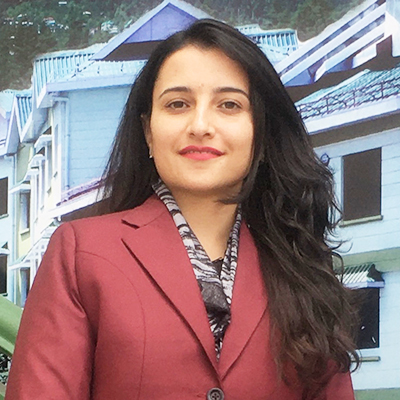The department of biotechnology and microbiology was started at RKMV in 2012. Our biotechnology and microbiology course examine how microorganisms can be used to produce improved industrial products and numerous applications of biotechnology and microbiology in various fields like therapeutics, diagnostics, genetically modified crops for agriculture, processed food, bioremediation, waste treatment, and energy production.
The department offers a wide spectrum of courses spread over three years. The course curriculum has both academic and industrial training programs including research institutes visits. The department provide opportunity to learn in new, spacious and modern teaching laboratories which provide good facilities for practicals.
The faculty of the department are well trained and dedicated towards teaching and conducting practical’s in order to equip the students with skills and practical knowledge.
Students Enrolled
| Bsc. Hons Biotechnology | Students | Total Seats |
|---|---|---|
| 1st Year | 17 | 25 |
| 2nd Year | 14 | 25 |
| 3rd Year | 12 | 25 |
Students Enrolled
| Bsc. Hons Microbiology | Students | Total Seats |
|---|---|---|
| 1st Year | 11 | 25 |
| 2nd Year | 12 | 25 |
| 3rd Year | 8 | 25 |
Faculties

Dr. Rajesh Chauhan
Coordinator
Dr. Kiran Sharma
Microbiology & Biotechnology Faculty
Dr. Poonam Kumari
Microbiology & Biotechnology Faculty
Dr. Ambika Sharma
Biotechnology & Microbiology Faculty
Mr. Amit Sharma
Biotechnology & Microbiology Faculty
Ms. Poonam Thakur
ClerkFaculties Profile
| Name | Academic Qualification | Designation | Teaching Experience | E-mail ID |
|---|---|---|---|---|
|
Dr. Kiran Sharma
|
Ph.D, M.Phil, NET, SET
|
Assistant Professor
|
11 Years
|
Kiransharmamicro@gmail.com
|
|
Dr. Poonam Kumari
|
Ph.D, NET
|
Assistant Professor
|
10 Years
|
poonam.microbio@gmail.com
|
|
Mr. Amit Sharma
|
M.Sc., GATE, SET, M.A. NET (Political
Science)
|
Assistant Professor
|
3 Years
|
amitsharmabiotec@gmail.com
|
|
Dr. Ambika Sharma
|
Ph.D
|
Assistant Professor
|
2 Years
|
ambikasharmaphdbiotech@gmail.com
|
Eligibility
| Programme/Course/Level | Duration | Eligibility | Admission Procedure |
|---|---|---|---|
|
B.Sc. (Hons) Biotechnology
|
3 Years
|
10+2 Medical
|
On Merit Basis
|
|
B.Sc. (Hons) Microbiology
|
3 Years
|
10+2 Medical
|
On Merit Basis
|
PROGRAMME OUTCOME
| Year | Course Code | Course Type | Course Name | Course Outcome/ Objective |
|---|---|---|---|---|
|
BSc First Year
|
BIOTECH1C01
|
Core Course
|
Biochemistry & Metabolism
|
The course aims to provide students with a
basic understanding of the molecular architecture of eukaryotic cells and
organelles, including membrane structure and dynamics; the principles of
bioenergetics and enzyme catalysis; the chemical nature of biological
macromolecules, their three-dimensional construction, and the principles of
molecular recognition
|
|
BSc First Year
|
BIOTECH1C02TH PR
|
Core Course
|
General Microbiology
|
The objective of the subject is to equip
the students to gain knowledge about prokaryotic and eukaryotic cellular
processes, interaction of microorganisms among themselves, with physical and
chemical agents and higher order organisms in environment and biological systems
to various conditions.
|
|
BSc First Year
|
BIOTECH1C03TH PR
|
Core Course
|
Genetics
|
The goal of this course to understand the
inheritance pattern ,linkages and population genetics with excellent examples
|
|
BSc First Year
|
BIOTECH1C04TH PR
|
Core Course
|
Molecular Biology
|
Introduce the student into the world of
Molecular Biology, to understand the transfer of genetic information from
nucleic acid till protein synthesis and cell function and to help the student to
know the general structure, organization and function of eukaryotic cells.
|
|
BSc First Year
|
GE-1 MICRO1GE01
|
Generic Elective
|
Cell Biology
|
The course will provide an overview of
cells, their origin and evolution. How they work in healthy and diseased state.
Molecular composition of cytoplasm and better understanding how living things
live.
|
|
BSc First Year
|
GE-2 CHEM GE 103
|
Generic Elective
|
Chemistry-1
|
|
|
BSc First Year
|
ENVS1AECC02
|
Ability Enhancement Compulsory Course (AEC)
|
Environment Science
|
The goal of environmental education is to
develop a world population that is aware of, and concerned about, the
environment and its associated problems, and which has the knowledge, skills,
attitudes, motivations, and commitment to work individually and collectively
towards solutions of current problems .
|
|
BSc Second Year
|
BIOTECH2C05
|
Core Course
|
Immunology
|
This course explores immunology, how the
body defends itself from constant assault by parasites and pathogens. This
course will present the fundamentals of both innate and adaptive immunity,
emphasizing functional interactions among cells and organs. We will cover
signaling, pathogen recognition and the division of labor among myeloid,
lymphoid and supporting cells.
|
|
BSc Second Year
|
BIOTECH2C06
|
Core Course
|
Bioprocess Technology
|
The course will introduce the students to
bioprocess technology and will impart knowledge about use of microorganisms for
generating various useful products using bioprocess technology, use of
bioreactors and their process parameters
|
|
BSc Second Year
|
BIOTECH2C07TH PR
|
Core Course
|
Recombinant DNA Technology
|
To familiarize the student with emerging
field of biotechnology i.e. Recombinant DNA Technology as well as to create
understanding in wet lab techniques in genetic techniques.
|
|
BSc Second Year
|
BIOTECH2C08TH BIOTECH2C08PR
|
Core Course
|
Environmental Biotechnology
|
The main objective of the subject is to
impart an understanding about the use of microorganisms to solve environmental
problems and taxonomic, ecological and genetic relationship among
microorganisms.
|
|
BSc Second Year
|
BIOTECH2C09 TH BIOTECH2C09PR
|
Core Course
|
Bacteriology and virology
|
The thrust of this course is to make aware
students with basics of bacteriology and virology by providing knowledge of
bacterial viral structure growth replication and nutrition characteristics.
|
|
BSc Second Year
|
BIOTECH2C10TH BIOTECH2C10PR
|
Core Course
|
Microbial Physiology
|
The course will provide the information
about growth and metabolism of microorganisms, microbial relationship.
Relationship between metabolism and energy source
|
|
BSc Second Year
|
GE-3 MICRO2GE02TH MICRO2GE02PR
|
Generic Elective
|
Bio Analytical Tools
|
To develop the skills of the application of
basic and advanced techniques employed in quantitative and qualitative analysis
of biomolecules.
|
|
BSc Second Year
|
GE-4 CHEM GE 205
|
Generic Elective
|
Chemistry-2
|
|
|
BSc Second Year
|
BIOTECH2SEC01 TH BIOTECH2SEC01 PR
|
Skill Enhancement Elective Course (SEC)
|
Enzymology
|
The major objective is to help students
know the structure and properties of macromolecules that interact to maintain
and perpetuate the living systems.
|
|
BSc Second Year
|
BIOTECH2SEC04 TH BIOTECH2SEC04 PR
|
Skill Enhancement Elective Course (SEC)
|
Industrial Fermentations
|
To provides the knowledge of basic
principle of fermentation process, which will help students to design, develop
and operate industrial level fermentation process.
|
|
BSc Third Year
|
BIOTECH3C11TH BIOTECH3C11PR
|
Core Course
|
Animal Biotechnology
|
This course helps students to understand
use of biotechnology techniques in animal welfare including human by providing
knowledge of transgenic animals gene therapy and assistive reproductive
techniques .
|
|
BSc Third Year
|
BIOTECH3C12 TH BIOTECH3C12 PR
|
Core Course
|
Plant Biotechnology
|
To impart understanding of the basic
principles of the plant sciences and molecular biology, as well as the
integration of these disciplines, to provide healthy plants in a safe
environment for food, non-food, feed and health applications.
|
|
BSc Third Year
|
BIOTECH3C13TH BIOTECH3C13PR
|
Core Course
|
Medical Microbiology Medical
|
The subject equips students with the
knowledge of diagnosing and treating diseases caused by bacteria, fungi and
parasites.
|
|
BSc Third Year
|
BIOTECH3C13TH BIOTECH3C13PR
|
Core Course
|
Medical Microbiology Medical
|
The subject equips students with the
knowledge of diagnosing and treating diseases caused by bacteria, fungi and
parasites.
|
|
BSc Third Year
|
BIOTECH3C14 TH BIOTECH3C14 PR |
Core Course
|
Food Biotechnology
|
The objective of the subject is to provide
learning and to develop professional skills for planning and coordinating
activities in specifically, the innovative technologies applied to food
production and control of food quality and safety.
|
|
BSc Third Year
|
BIOTECH3DSE01
|
Discipline Specific Elective (DSE)
|
Biochemical Engineering
|
To apply the chemical engineering
principles in biological systems. Introduction to Biochemical Engineering:
Comparative study of chemical and biochemical processes, Basic concepts of
microbiology.
|
|
BSc Third Year
|
BIOTECH3DSE02
|
Discipline Specific Elective (DSE)
|
Advances in Microbiology
|
|
|
BSc Third Year
|
BIOTECH3DSE03
|
Discipline Specific Elective (DSE)
|
Ecology and Environment Management
|
To broaden their ecological knowledge in
subjects such as energy, landscapes, air, water, natural resources and wildlife.
|
|
BSc Third Year
|
BIOTECH3DSE06
|
Discipline Specific Elective (DSE
|
Molecular Diagnostics
|
To develop the skills of the application of
basic and advanced techniques employed in quantitative and qualitative analysis
of biomolecules.
|
B Sc (Hons.) Microbiology
PROGRAMME OUTCOME
| Year | Course Code | Course Type | Course Name | Course Outcome/ Objective |
|---|---|---|---|---|
|
BSc First Year
|
MICRO1C01TH MICRO1C01PR
|
Core Course
|
Introduction to Microbiology & Microbial
Diversity
|
The subject will provide detailed
information about growth and metabolism of microorganisms, microbial
relationship. Relationship between metabolism and energy source. Diversity among
microorganisms and their interaction among themselves.
|
|
BSc First Year
|
MICRO1C02TH MICRO1C02PR
|
Core Course
|
Bacteriology
|
The course provide basic knowledge of
bacteria with special consideration to their growth,replication , classification
and culturing techniques.
|
|
BSc First Year
|
MICRO1C03TH MICRO1C03PR
|
Core Course
|
Biochemistry
|
The course aims to provide students with a
basic understanding of the molecular architecture of eukaryotic cells and
organelles, including membrane structure and dynamics; the principles of
bioenergetics and enzyme catalysis; the chemical nature of biological
macromolecules, their three-dimensional construction, and the principles of
molecular recognition.
|
|
BSc First Year
|
MICRO1C04TH MICRO1C04PR
|
Core Course
|
Virology
|
Through this course students will be able
to understand the nature ,structure replication, and infection cycle of viruses.
|
|
BSc First Year
|
GE-1 BIOTECH1GE01TH BIOTECH1GE01PR
|
Generic Elective
|
Mycology and Phycology
|
The course aims to provide students with
knowledge and understanding of the nature ,structure replication, and infection
cycle of algae and fungi
|
|
BSc First Year
|
GE-2 BIOTECH1GE02TH BIOTECH1GE02PR
|
Generic Elective
|
Cell Biology
|
The course will provide an overview of
cells, their origin and evolution. How they work in healthy and diseased state.
Molecular composition of cytoplasm and better understanding how living things
live.
|
|
BSc First Year
|
ENGL103
|
Ability Enhancement Compulsory Course (AEC)
|
English Communication
|
|
|
BSc Second Year
|
ENVS1AECC02
|
Ability Enhancement Compulsory Course (AEC)
|
Environment Science
|
The goal is to develop a population that is
aware of, and concerned about, the environment and its associated problems, and
which has the knowledge, skills, attitudes, motivations, and commitment
|
|
BSc Second Year
|
MICRO2C05TH MICRO2C05PR
|
Core Course
|
Microbial physiology & Metabolism
|
The course will provide the information
about growth and metabolism of microorganisms, microbial relationship.
Relationship between metabolism and energy source
|
|
BSc Second Year
|
BIOTECH2C07TH PRMICRO2C06TH MICRO2C06PR
|
Core Course
|
Environmental Microbiology
|
The main objective of the subject is to
impart an understanding about the use of microorganisms to solve environmental
problems and taxonomic, ecological and genetic relationship.
|
|
BSc Second Year
|
MICRO2C07TH MICRO2C07PR
|
Core Course
|
Recombinant DNA Technology
|
To familiarize the student with emerging
field of biotechnology i.e. Recombinant DNA Technology as well as to create
understanding in wet lab techniques in genetic techniques.
|
|
BSc Second Year
|
MICRO2C08TH MICRO2C08PR
|
Core Course
|
Industrial Microbiology
|
The aim of the course is to give the
students broad theoretical and practical skills in industrial microbiology. To
discuss the role of microorganisms in industry, as well as to carry out
experiments to produce microbial metabolites.
|
|
BSc Second Year
|
MICRO2C09TH MICRO2C09PR
|
Core Course
|
Microbes in Sustainable Agriculture and
Development
|
This course provides insight of how
microorganisms can be used in agricultural fields and to increase the crop yield
by using bio fertilizers and bioinsecticides.
|
|
BSc Second Year
|
MICRO2C10TH MICRO2C10PR
|
Core Course
|
Molecular Diagnostics
|
To develop the skills of the application of
basic and advanced techniques employed in quantitative and qualitative analysis
of biomolecules.
|
|
BSc Second Year
|
GE-3 BIOTECH2GE3 TH BIOTECH2GE3 PR
|
Generic Elective
|
Molecular Biology
|
Introduce the student into the world of
Molecular Biology, to understand the transfer of genetic information from
nucleic acid till protein synthesis and cell function and to help the student to
know the general structure, organization and function of eukaryotic cells.
|
|
BSc Second Year
|
GE-4 BIOTECH2GE04TH BIOTECH2GE04PR
|
Generic Elective
|
Immunology
|
This course explores immunology, how the
body defends itself from constant assault by parasites and pathogens. This
course will present the fundamentals of both innate and adaptive immunity,
emphasizing functional interactions among cells and organs. We will cover
signaling, pathogen recognition and the division of labor among myeloid,
lymphoid and supporting cells.
|
|
BSc Second Year
|
MICRO2SEC03
|
Skill Enhancement Elective Course (SEC)
|
Biofertilizers and Biopesticides
|
The subject will provide the basic
knowledge about biofertilizers. Type of microbes constitute potential
biofertilizer candidates (nitrogen fixers, phosphate solubilizers, plant growth
hormone producers, siderophore etc .
|
|
BSc Second Year
|
MICRO2SEC05
|
Core Course
|
Management of Human Microbial Diseases
|
This course Emphasis is placed on the study
of infectious diseases of humans, other animals and plants. Topics covered
include: introduction to microorganisms and their environment, microbial
structure and function; microbial molecular biology and genetics; bacterial
viruses; structure; an introduction to pathogen-host interactions; new and
emerging pathogens of humans and other animals; infectious disease and
mechanisms by which microbial pathogens interact with animals and plants;
biotechnological applications of bacteria.
|
|
BSc Third Year
|
MICRO3C11TH MICRO3C11PR
|
Core Course
|
Food and Dairy Microbiology
|
The Food and dairy Microbiology Short
course provides insight into the most recent developments of food-borne
pathogens, toxins, and contaminants that may occur in a food plant environment.
The short course is delivered in classroom and laboratory environments and
includes a mixture of theory, demonstrations, and practical sessions on the
fundamentals of food microbiology and food safety.
|
|
BSc Third Year
|
MICRO3C12TH MICRO3C12PR
|
Core Course
|
Medical Microbiology Medical
|
The subject equips students with the
knowledge of diagnosing and treating diseases caused by bacteria, fungi and
parasites.
|
|
BSc Third Year
|
MICRO3C13TH MICRO3C13PR
|
Core Course
|
Bioprocess Technology
|
The course will introduce the students to
bioprocess technology and will impart knowledge about use of microorganisms for
generating various useful products using bioprocess technology, use of
bioreactors and their process parameters.
|
|
BSc Third Year
|
MICRO3C14TH MICRO3C14PR |
Core Course
|
Instrumentation & Biotechniques
|
To develop the skills of the application of
basic and advanced techniques employed in quantitative and qualitative analysis
of biomolecules.
|
|
BSc Third Year
|
MICRO3DSE01
|
Skill Enhancement Elective Course (SEC)
|
Biochemical Engineering
|
To apply the chemical engineering
principles in biological systems. Introduction to Biochemical Engineering:
Comparative study of chemical and biochemical processes, Basic concepts of
microbiology
|
|
BSc Third Year
|
MICRO3DSE03
|
Skill Enhancement Elective Course (SEC)
|
Ecology and Environment Management
|
To broaden their ecological knowledge in
subjects such as energy, landscapes, air, water, natural resources and wildlife.
|
|
BSc Third Year
|
MICRO3DSE04
|
Skill Enhancement Elective Course (SEC)
|
Parasitology
|
Medical parasitology traditionally has
included the study of three major groups of animals: parasitic protozoa,
parasitic helminths (worms), and those arthropods that directly cause disease or
act as vectors of various pathogens.
|
|
BSc Third Year
|
MICRO3DSE06
|
Skill Enhancement Elective Course (SEC)
|
Advances in Microbiology
|
The goal of this subject is to provide a
platform to promote, share, and discuss various new issues and developments in
different areas of Microbiology.
|
Infrastructural Facilities
- Laminar Air Flow Cabinet
- Spectrophotometer
- Binocular Microscopes
- Incubator Shaker
- pH meter
- Centrifuge
- Autoclave
- Gel Electrophoresis Unit (Vertical)
- Micropipettes
- Hematometer
- Weighing Balance
